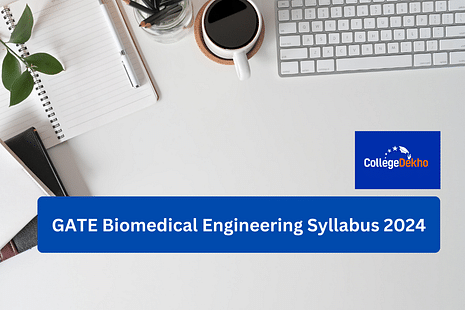- GATE Biomedical Engineering Syllabus
- Section Wise GATE Biomedical Engineering Syllabus
- GATE General Aptitude Syllabus
- GATE Biomedical Engineering Exam Pattern
- GATE Biomedical Engineering (BM) Marking scheme
- GATE Biomedical Engineering Preparation Tips
- GATE Biomedical Engineering Books
- GATE Paper Wise Links

GATE Biomedical Engineering Syllabus -
The Indian Institute of Science Bangalore has released the
GATE syllabus
for biomedical engineering specialization. Candidates will be able to download the syllabus of GATE BM from the official website. Candidates who will be sitting for the GATE BM exam must study from the official GATE biomedical engineering syllabus. There is a total of 10 sections included in the GATE BM paper along with 1 section of General Aptitude which is required for all engineering papers as per IISc Bangalore.
Latest:
GATE Admit Card released
Also read:
GATE Biomedical Engineering (BM) Question Papers: Previous year papers PDF Download
The GATE biomedical engineering syllabus sections consist of Engineering Mathematics, Electrical Circuits, Signals and Systems, Analog and Digital Electronics, Measurements and Control Systems, Sensors and Instrumentation, Human Anatomy and Physiology, Medical Imaging Systems, Biomechanics, and Biomaterials. To score the GATE cutoff marks on the first attempt, candidates must study the whole syllabus without missing any topics. We have provided the GATE biomedical engineering syllabus in this post.
Quick Link:
What is a Good Score in GATE Biotechnology (BT)?
Read the full article to get details on the official GATE syllabus for biomedical engineering, exam pattern, section-wise weightage, preparation tips, and more.
Also Check,
GATE Biomedical Engineering Syllabus
Biomedical engineering / medical engineering is the application of engineering design concepts and principles to medicine and biology for the aim of healthcare. Candidates who want to pursue a master's in GATE biomedical engineering specialization at the top tier engineering colleges must study the syllabus. This GATE Biomedical Engineering syllabus is the ideal approach to acquiring an overview of the subject's subjects and ideas.
Candidates can check the GATE biomedical engineering syllabus given below.
Section | Section Name |
|---|---|
1 | Engineering Mathematics |
2 | Electrical Circuits |
3 | Signals and Systems |
4 | Analog and Digital Electronics |
5 | Measurements and Control Systems |
6 | Sensors and Bioinstrumentation |
7 | Human Anatomy and Physiology |
8 | Medical Imaging Systems |
9 | Biomechanics |
10 | Biomaterials |
Quick Link: GATE Counselling Process
Section Wise GATE Biomedical Engineering Syllabus
Candidates who select Biomedical Engineering as their subject should go through the entire syllabus to comprehend the topics that must be covered. A thorough comprehension of the GATE Biomedical Engineering syllabus enables you to strategically organize your preparation. Engineering Mathematics, General Aptitude, and the main subject comprise the GATE Biomedical Engineering syllabus. Candidates can check the section-wise GATE biomedical engineering syllabus given below. The direct link to check the GATE BM Syllabus is provided below.
Quick Link: GATE Important Dates
GATE Biomedical Engineering Syllabus (Section 1): Engineering Mathematics
The Engineering Mathematics section of the GATE Biomedical Engineering syllabus covers subjects like residue theorem, linear regression, Laurent's series, and so forth. Go through the GATE syllabus for Biomedical Engineering section 1 given below.
- Linear Algebra: Matrix algebra, systems of linear equations, Eigenvalues, and Eigenvectors.
- Calculus: Mean value theorems, theorems of integral calculus, partial derivatives, maxima and minima, multiple integrals, Fourier series, vector identities, line, surface, and volume integrals, Stokes, Gauss, and Green's theorems.
- Differential Equations: First-order linear and nonlinear differential equations, higher-order linear differential equations with constant coefficients, method of separation of variables, Cauchy's and Euler's equations, initial and boundary value problems, and solution of partial differential equations.
- Analysis of Complex Variables: Analytic functions, Cauchy's integral theorem and integral formula, Taylor's and Laurent's series, residue theorem.
- Probability and Statistics: Sampling theorems, conditional probability, mean, median, mode and standard deviation, random variables, discrete and continuous distributions: normal, Poisson, and binomial distributions. Tests of Significance, statistical power analysis, and sample size estimation.
- Linear Regression and correlation analysis; Numerical Methods: Matrix inversion, numerical solutions of nonlinear algebraic equations, iterative methods for solving differential equations, numerical integration.
GATE Biomedical Engineering Syllabus (Section 2): Electrical Circuits
Norton, power transmission, inductor, and other subjects are covered in the Electrical Circuits section of the GATE Biomedical Engineering syllabus. Check the detailed GATE syllabus for Biomedical Engineering section 2 given below.
Voltage and Current Sources
Independent, dependent, ideal, and practical; v-i relationships of resistor, inductor, and capacitor; transient analysis of RLC circuits with DC excitation; Kirchoff’s laws, superposition, Thevenin, Norton, maximum power transfer and reciprocity theorems; Peak, average, and RMS values of ac quantities; apparent, active and reactive powers; phasor analysis, impedance, and admittance; series and parallel resonance, realization of basic filters with R, L and C elements, Bode plot.
GATE Biomedical Engineering Syllabus (Section 3): Signals and Systems
Topics like Laplace and Fourier transform, periodic, aperiodic, and impulse signals, etc. are covered in the GATE biomedical engineering syllabus of signals and system section. Candidates can check the complete GATE syllabus for section 3 given below.
Continuous and Discrete Signal and Systems
Periodic, aperiodic, and impulse signals; Sampling theorem; Laplace and Fourier transform; impulse response of systems; transfer function, a frequency response of first and second order linear time-invariant systems, convolution, correlation. Discrete-time systems - impulse response, frequency response, DFT, Z - transform; basics of IIR and FIR filter.
GATE Biomedical Engineering Syllabus (Section 4): Analog and Digital Electronics
The GATE biomedical engineering syllabus of section 4 analog and digital electronics includes topics such as instrumentation amplifier, buffer, MUX/DEMUX, multi-vibrators, etc. Go through the GATE biomedical engineering syllabus of section 4 given below.
Basic characteristics and applications of diode, BJT, and MOSFET; Characteristics and applications of operational amplifiers
Difference amplifier, adder, subtractor, integrator, differentiator, instrumentation amplifier, buffer, filter, and waveform generator. Number systems, Boolean algebra; combinational logic circuits - arithmetic circuits, comparators, Schmitt trigger, encoder/decoder, MUX/DEMUX, multi-vibrators; Sequential circuits - latches and flip flops, state diagrams, shift registers, and counters; Principles of ADC and DAC; Microprocessor- architecture, interfacing memory, and input-output devices.
Quick Link: GATE Answer Ket
GATE Biomedical Engineering Syllabus (Section 5): Measurements and Control Systems
Electrical isolation, veins, tissues, and other subjects are covered in the sensors and bio-instrumentation section of the GATE Biomedical Engineering syllabus. Check the GATE biomedical engineering syllabus of section 5 measurements and control system given below.
SI units, systematic and random errors in measurement, expression of uncertainty
Accuracy and precision index, propagation of errors; PMMC, MI, and dynamometer type instruments; DC potentiometer; bridges for measurement of R, L, and C, Q-meter. Basics of control system - transfer function.
GATE Biomedical Engineering Syllabus (Section 6): Sensors and Bioinstrumentation
Electrical isolation, veins, tissues, and other subjects are covered in the sensors and bio-instrumentation section of the GATE Biomedical Engineering syllabus. Go through section 6 of the GATE syllabus for biomedical engineering given below.
Sensors
Resistive, capacitive, inductive, piezoelectric, Hall effect, electro-chemical, optical; Sensor signal conditioning circuits; application of LASER in sensing and therapy. Origin of biopotentials and their measurement techniques - ECG, EEG, EMG, ERG, EOG, GSR, PCG, Principles of measuring blood pressure, body temperature, volume and flow in arteries, veins and tissues, respiratory measurements, and cardiac output measurement. Operating principle of medical equipment-sphygmomanometer, ventilator, cardiac pacemaker, defibrillator, pulse oximeter, hemodialyzer Electrical Isolation (optical and electrical), and Safety of Biomedical Instruments.
Quick Link: GATE Admit Card
GATE Biomedical Engineering Syllabus (Section 7): Human Anatomy and Physiology
The human anatomy and physiology portion of the GATE Biomedical Engineering syllabus covers subjects such as the fundamentals of cells, tissue types, and organ systems. Go through the complete GATE syllabus for biomedical engineering of section 7 given below.
Basics of cell, types of tissues and organ systems; Homeostasis; Basics of organ systems - musculoskeletal, respiratory, circulatory, excretory, endocrine, nervous, gastro-intestinal, and reproductive.
GATE Biomedical Engineering Syllabus (Section 8): Medical Imaging Systems
The GATE Biomedical Engineering syllabus section 8 comprises topics such as instrumentation, and image production techniques in medical imaging modalities like X-Ray, Computed Tomography, and Ultrasound. Candidates can check the detailed section 8 GATE syllabus for biomedical engineering provided below.
Basic physics, Instrumentation, and image formation techniques in medical imaging modalities such as X-ray, Computed Tomography, Single Photon Emission Computed Tomography, Positron Emission Tomography, Magnetic Resonance Imaging, and Ultrasound.
Quick Link: GATE Cutoff
GATE Biomedical Engineering Syllabus (Section 9): Biomechanics
The GATE Biomedical Engineering syllabus contains subjects such as soft Tissues - Structure, functions, material properties, Hard Tissues - Definition of Stress and Strain, etc. Get the detailed GATE syllabus for Biomedical Engineering section 9 given below.
Kinematics of muscles and joints
Free-body diagrams and equilibrium, forces, and stresses in joints, biomechanical analysis of joints, Gait analysis; Hard Tissues - Definition of Stress and Strain, Deformation Mechanics, structure and mechanical properties of bone - cortical and cancellous bones; Soft Tissues - Structure, functions, material properties, viscoelastic properties, Maxwell & Voight models; Biofluid mechanics - Flow properties of blood in the intact human cardiovascular system.
GATE Biomedical Engineering Syllabus (Section 10): Biomaterials
The biomaterials section of the GATE Biomedical Engineering syllabus includes subjects like electron, atomic force microscopy, rheology, and so on. Candidates can check the complete GATE Biomedical Engineering Syllabus of section 10 below.
Basic properties of biomaterials
Metallic, Ceramic, Polymeric, and Composite; Fundamental characteristics of implants - biocompatibility, bioactivity, biodegradability; Basics of drug delivery; Basics of tissue engineering. Biomaterial characterization techniques - Rheology, Atomic Force Microscopy, Electron Microscopy, Transmission Electron Microscopy Fourier Transform Infrared Spectroscopy.
GATE General Aptitude Syllabus
The GATE general aptitude section is included in all the engineering papers of GATE. This section assesses the candidates' general, analytical, and verbal knowledge. The following subjects and topics are included in the General Aptitude part of the GATE biomedical engineering syllabus.
Section | Topics |
|---|---|
Quantitative Aptitude |
|
Analytical Aptitude |
|
Spatial Aptitude |
|
Verbal Aptitude |
|
GATE Biomedical Engineering Exam Pattern
Understanding the BM exam pattern is essential as it provides important details like exam duration, mode, question type, marking scheme, etc. On the basis of this, candidates can further prepare their study plans. IIT Kanpur has released the GATE biomedical engineering exam pattern. Candidates can check the GATE exam pattern of biomedical engineering given below.
Particular | Details |
|---|---|
Exam Mode | Computer Based (Online Mode) |
Question Type | GATE BM will mostly comprise the following question types: Multiple Choice Questions (MCQs), Multiple Select Questions (MSQ), and Numerical Answer Type (NAT). |
Exam Duration | The GATE BM paper will be a three-hour computer-based exam. PWD applicants will be given extra time according to the guidelines. |
Exam Language | English |
Total Marks | 100 marks |
Total Number of Questions | 65 questions |
Marks of Questions | There will be 1 and 2-mark questions on the paper. |
GATE Biomedical Engineering (BM) Marking scheme
Candidates should go through the GATE BM marking scheme so that they can attempt the questions accordingly in the real-time GATE exam.
Section Wise GATE Biomedical Engineering Marking Scheme
Subject | No. of Questions | Marks |
|---|---|---|
General Aptitude | 10 | 15 |
Engineering Mathematics | 10 | 13 |
Biomedical Engineering Subjects | 45 | 72 |
Total | 65 | 100 |
Question Wise GATE Biomedical Engineering Marking Scheme
Question Type | Negative marking for wrong answers. |
|---|---|
MCQ |
|
MSQs/ NAT | No negative marking |
Quick Link: GATE Paper Analysis
GATE Biomedical Engineering Preparation Tips
Every year, many students apply for the GATE exam's major disciplines, which include biomedical engineering. Candidates must put in the effort and follow GATE Biomedical Engineering preparation tips if they want to pass the GATE entrance test since competition is fierce. Check the GATE preparation tips for biomedical engineering given below.
- Firstly, go through the GATE exam pattern and syllabus. The GATE BM exam pattern will provide applicants with information on the paper mode, scoring system, question kinds, etc
- Thoroughly study the GATE biomedical engineering syllabus and check the subjects and topics that must be learned
- Select the best GATE books for preparation. Refer to the top authors' book
- Make a proper GATE biomedical engineering study plan. Add all the subjects and topics to it. Also, keep days for mock tests and revision
- Begin your exam preparation. Study each topic, and understand the formulae
- To assess your exam preparation, candidates could complete GATE previous year exams and mock tests. Students can learn about the examination's difficulty level and the kind of questions that will be asked by taking practice exams from previous years.
- It is recommended that you revise the GATE Biomedical Engineering Syllabus on a regular basis to avoid forgetting what you have already learned.
- Candidates must not only practice and study but also pay attention to their mental health and avoid stress. Eat healthily and get plenty of rest
GATE Biomedical Engineering Books
GATE Biomedical Engineering's best books are necessary for test preparation. You will be able to study and grasp the GATE biomedical engineering syllabus, topics, and chapters better if you know the best books. You should select the most recent edition feasible, based on the revised GATE Biomedical Engineering Syllabus and Exam Pattern. For your reference, we have provided some of the best GATE books for the preparation of a biomedical engineering paper below.
Book Name | Author name |
|---|---|
Fundamentals of Biomedical Engineering | G.S Sawhney |
Intro to Biomedical Engineering | Domach |
GATE Engineering Mathematics for all streams | Arihant Publications |
GATE Engineering Mathematics | Made Easy Publications |
Introduction to Biomedical Engineering | Enderle |
A Modern Approach to Verbal and Non-Verbal Reasoning | R.S Aggarwal |
How to Prepare for Quantitative Aptitude | Arun Sharma |
High School English Grammar | Wren and Martin |
Biomedical Instrumentation | R.S Khandpur |
GATE Paper Wise Links
The paper wise links for GATE can be downloaded by clicking on the links below -
GATE Exam Materials
Other GATE Articles
CollegeDekho wishes you luck for your upcoming GATE exam. We hope that this post on GATE Biomedical Engineering Syllabus was informative and helpful to you.
Are you feeling lost and unsure about what career path to take after completing 12th standard?
Say goodbye to confusion and hello to a bright future!

Was this article helpful?




















Similar Articles
TNEA Round 2 Counselling 2025: Dates (OUT), Eligible Ranks, Vacant Seats, Process, Documents
TNEA Round 3 Counselling: Dates (OUT), Eligible Ranks, Vacant Seats, Process, Documents
TNEA Round 3 Seat Allotment 2025: Dates (OUT), Seat Acceptance Process, Fees
TNEA Counselling 2025 - Dates, Process, Choice Filling, Seat Allotment, Participating Colleges
Kerala Polytechnic Second Allotment List 2025: Release Date, Steps to Download, Admission Process, Last Index Cutoff Rank
Maharashtra Direct Second Year Diploma (DSD) Admission 2025: Dates (Out), Application (Last Date Extended), Eligibility, Merit List